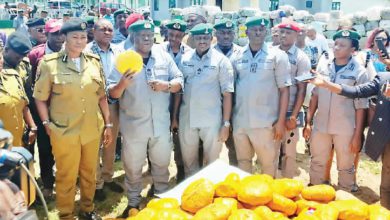
There are two kinds of light, the glow that illuminates and the glare that obscures” –James Thumber.
The above quote illustrates the two sets of persons who embark on holy pilgrimage to Makkah. Indeed, Nigerian pilgrims, just like people from other parts of the world to the annual hajj, are full of complicated characters – those who are capable of doing great things and those with penchant for doing the opposite.
In recent years, activities of the latter group have left a sour taste in the palate of the country, particularly the National Hajj Commission of Nigeria (NAHCON). Their actions bordering on drug trafficking, overstaying or abscondment – have set off chains of negative reactions from the host country – the Kingdom of Saudi Arabia. Apart from putting their lives at risk, those who engage in these unlawful behaviours have heightened the security concern of the Saudi government and the situation had sometimes led to the impoundment of materials they deemed suspicious.
With the start of the airlift of pilgrims for the 2019 hajj, it is imperative for stakeholders to set in motion actions that would help to arrest or eliminate the twin activities of drug trafficking and abscondment.
How can we achieve drug-free hajj operations?
Although drug trafficking and abscondment are not peculiar offences to Nigerian hajjis, the cases of Nigerians are isolated, compared to other nations as many other nationals have been caught in the web of even worse crimes. But listening or hearing the narratives of drug busters, one can reasonably assume that the incident is not as pandemic as it may seem, though extremely nagging and negative for the country’s image. Therefore, an outline and in-depth analysis of the way out will suffice.
Provision of scanners
A comprehensive analysis of the circumstances causing an increase in the number of holy land-bound drug peddlers showed that the lack of standard and modern equipment to detect drugs and prohibited items at most of the hajj departure centres constitute the number one factor. For the fact that the syndicates know that apart from the Murtala Mohammed International Airport, Lagos and Malam Aminu Kano International Airport, Kano, many airport departure centres lack equipment to detect prohibited items, the unscrupulous persons use them as drug routes to Saudi Arabia. It is, therefore, imperative for the Federal Airports Authority of Nigeria (FAAN) to provide necessary equipment in the airports.
Closely related to this is the deployment of personnel, especially those of intelligence agencies, in all the airports of operations to complement other airport staff. This would go a long way to sanitise service and curb compromise by regular staff at those centres. It was quite a warming that FAAN was able to smash drug rings operating at the Kano airport but this action must be extended to other airports.
Enlightenment/education
Now is a good time to raise the tempo of enlightenment and education of intending pilgrims beyond the performance of hajj rites to include some information and issues about drug peddling, overstaying and abscondment. It must form the major subjects that state pilgrims welfare boards and agencies must focus on before the commencement of airlift. Indeed, emphasis should be placed on educating them on protocol, prohibited items. It is when this is adequately done that the states and the nation can proudly beat their chests that they have worked towards producing better Nigerian hajjis.
On the part of NAHCON, it has taken a significant lead with the launch of a drive to boost detection of overstayers, absconders and drug traffickers through the institution of a national task force.
The task force’s membership was drawn from the intelligence community, Nigeria Immigration Service (NIS), National Agency for the Prohibition of Trafficking in Persons (NAPTIP), Association of Hajj and Umrah Operators of Nigeria (AHUON). Its terms of reference include detection and prevention of abscondment, overstaying and drug peddling on the part of intending pilgrims before embarking on the spiritual journey.
At its inaugural sitting, the commission highlighted the damage the issues of overstaying the duration of visa eligibility, abscondment and related crimes had caused the commission in terms of consular and bilateral skirmishes with the Kingdom of Saudi Arabia and urged members of the committee to strive to eliminate the ugly incidents.
Also, as part of its evolving device put in place is presentation of guarantor as a precondition for registration for Hajj 2019. The guarantor has to sign an undertaking that the intending pilgrim would be of good behaviour and will return home on completion of hajj exercise. He would also be responsible for any negative action of the pilgrim.
What is required now is support from everyone, including the hajjis and relevant stakeholders, so that Nigeria can achieve a 2019 hajj free of hitches and crimes.
Ubandawaki is of the Information and Publication Division of NAHCON, Abuja.



